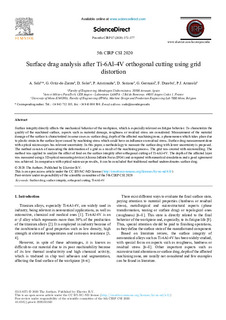
Título
Surface drag analysis after Ti-6Al-4V orthogonal cutting using grid distortionAutor-a
Fecha de publicación
2020Otras instituciones
Arts et Metiers Institute of TechnologyUniversité de Mons (Bélgica)
Versión
Version publicadaTipo de documento
ArtículoArtículoIdioma
InglésDerechos
© 2020 The AuthorsAcceso
Acceso abiertoVersión de la editorial
https://doi.org/10.1016/j.procir.2020.02.040Publicado en
Procedia CIRP Vol. 87. Pp. 372-377, 2020Editorial
Elsevier LtdPalabras clave
Surface dragsurface integrity
Orthogonal cutting
Ti-6Al-4V
Resumen
Surface integrity directly affects the mechanical behavior of the workpiece, which is especially relevant on fatigue behavior. To characterize the quality of the machined surface, aspects such as mate ... [+]
Surface integrity directly affects the mechanical behavior of the workpiece, which is especially relevant on fatigue behavior. To characterize the quality of the machined surface, aspects such as material damage, roughness or residual stress are considered. Measurement of the material damage of the surface is characterized in some cases as surface drag, depth of the affected machining zone, a phenomenon which takes place due to plastic strain in the surface layer caused by machining stress which could have an influence on residual stress. Surface drag measurement done with optical microscopes has relevant uncertainty. In this paper, a methodology to measure the surface drag with lower uncertainty is proposed. The method consists of measuring the deformation of a grid as a result of the machining process. The grid was created with micromilling. The method was applied to analyze the effect of feed on the surface integrity after orthogonal cutting of Ti-6Al-4V. The depth of the affected layer was measured using a 3D optical measuring device (Alicona Infinite Focus IFG4) and compared with numerical simulations and a good agreement was achieved. In comparison with optical microscope results, it can be concluded that traditional method underestimates surface drag. [-]
Sponsorship
Gobierno Vasco-Eusko JaurlaritzaID Proyecto
info:eu-repo/grantAgreement/GV/Convocatoria de ayudas a la Investigación básica y-o aplicada 2018-2020/PIBA 2018-85/CAPV/Desarrollo de banco de ensayos de mecanizado lineal de alta velocidad para análisis de la condición de integridad superficial de aleaciones aeronáuticas y validación de modelos predictivos del proceso de corte/MECAEROColecciones
- Artículos - Ingeniería [761]
El ítem tiene asociados los siguientes ficheros de licencia:





















